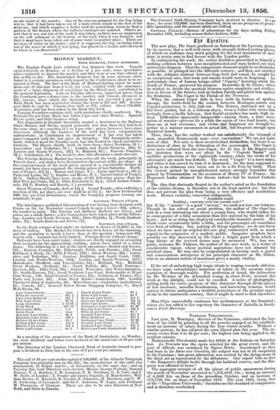Otairts.
The new play, The Cagot, produced on Saturday at the Lyceum, proves by its success, that a well-told story, with strongly defined resting-place; at which an audience may stand gasping for the next instalment of inci- dent, is pretty sure to find favour with the London public. In commencing his work, the author doubtless prescribed to himself a striking collision between man unsophisticated and man decked out with aristocratic frippery. That the antagonistic elements might be as dissimilar as possible, he plunged into the fifteenth century ; and then, not satisfied with the Ordinary contrast between liege-lord and vassal, he sought for an exceptional race, that lords and vassals would unite in despising. An unfortunate class of human beings called " Cagots," hovering about the South of France, answered his purpose. Bernardin de St. Pierre, when he wished to decide the question between native simplicity and civiliza- tion in favour of the former, took an Indian Pariah and pitted hint against the Brahmins. The Cagot is the Pariah of the Pyrenees. When the outcast Cagot falls in love with an heiress of spotless lineage, the battle-field for the contest between Montague-nature and Capulet-aristocracy is duly laid out. The Romeo, stationed not on a fair level garden, but in a hideous abyss, woos a Juliet who views him lovingly from a lordly balcony, that feudal prejudice has made high in- deed. Difficulties apparently insuperable—among them, a false accu- sation of murder—prevent for a while the union of two fond hearts ; but these are at last overcome, and virtue and happiness are brought to. gether in a manner uncommon in actual life, but frequent enough upon theatrical boards.
Thus, then, has the author worked -out satisfactorily the triumph of man, unspoiled Itonaseauish man—over convention? We are not quite sure of that. Not only is there no invividual distinction, but there is no distinction of class in the delineation of the personages. The Cagot is even more cultured than the non-Cagot; for he has at his fingers-ends the doctrines that were set afloat by the " Central Social " and suchlike productions of the eighteenth century, while the views of his adversaries are much less definite. The word Cagot" is a mere name, and when it has served its turn it is dismissed ; for the man supposed to belong to an infamous race turns out to be a De Foix by birth. Thus the victory gained by unsophisticated nature strongly resembles that gained by Protestantism on the accession of Henry IV of France : the Huguenot leader obtained his throne indeed—but he turned Catholic first.
The idea that obviously floated in the author's mind as the foundation of the embryo drama, is therefore not in the least carried out : but that does not prevent his play from being a very effective and meritorious work. Horace exclaims, somewhat indignantly, • " Amphora ccepit Institui; curronte rota cur urceus exit ? "
but if the " litmus " is a good "urceus," we need not lose our tempers. Though he has solved no social problem, the author of The Cagot has told us a very interesting tale about a young hero, who would rather die in consequence of a false accusation than live unloved by the lady of his heart ; and in so doing has displayed considerable dramatic power. His blank verse occasionally halts a little, and his personages are sometimes over fond of talking ; but, putting all things together, we do not know when we have seen an original five-act play constructed with so much regard to the exigencies of a modern public. Sanguine prophets have possibly ere this discovered in The Cagot a bright point from which a long future of the revived drama may be measured. We, less san- guine, welcome Mr. Falkner, the author of the new work, as a writer of considerable vigour, whose poetical aspirations have not dimmed his practical sense. He may also be congratulated on having such a genial and conscientious interpreter of his principal character as Mr. Dillon, who to an abstract notion of manliness gives a manly vitality.
































 Previous page
Previous page